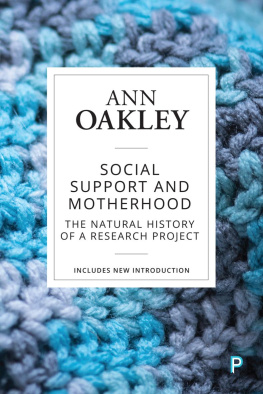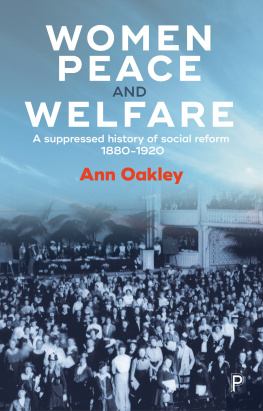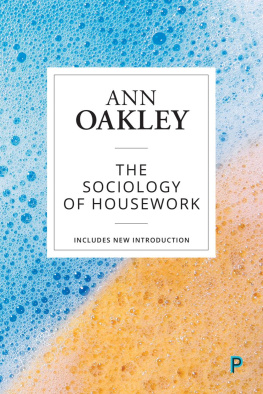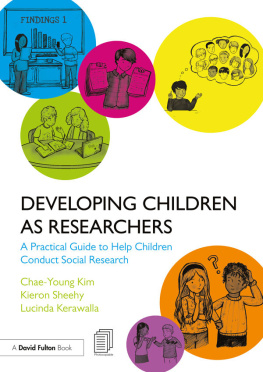First published in Great Britain in 1992 by Blackwell Publishers, this edition published in 2018 by
Policy Press University of Bristol 1-9 Old Park Hill Bristol BS2 8BB UK Tel +44 (0)117 954 5940 e-mail
North American office: Policy Press c/o The University of Chicago Press 1427 East 60th Street Chicago, IL 60637, USA t: +1 773 702 7700 f: +1 773-702-9756 e:
Ann Oakley 2018
British Library Cataloguing in Publication Data
A catalogue record for this book is available from the British Library.
Library of Congress Cataloging-in-Publication Data
A catalog record for this book has been requested.
ISBN 978-1-4473-4616-6 hardcover
ISBN 978-1-4473-4949-5 ePub
ISBN 978-1-4473-4950-1 Mobi
ISBN 978-1-4473-4947-1 ePdf
The right of Ann Oakley to be identified as author of this work has been asserted by her in accordance with the 1988 Copyright, Designs and Patents Act.
All rights reserved: no part of this publication may be reproduced, stored in a retrieval system, or transmitted in any form or by any means, electronic, mechanical, photocopying, recording, or otherwise without the prior permission of Policy Press.
The statements and opinions contained within this publication are solely those of the author and not of The University of Bristol or Policy Press. The University of Bristol and Policy Press disclaim responsibility for any injury to persons or property resulting from any material published in this publication.
Policy Press works to counter discrimination on grounds of gender, race, disability, age and sexuality.
Cover design by blu inc, Bristol
Front cover: image kindly supplied by istock
Readers Guide
This book has been optimised for PDA.
Tables may have been presented to accommodate this devices limitations.
Image presentation is limited by this devices limitations.
Reading ones old texts is a journey into the past. The landscape was different then: the preoccupations were different, and so was the intellectual/social/political context that shaped these preoccupations. But, at the same time, there is usually a strong strand of continuity. The reasons for writing Social Support and Motherhood and for doing the research the book describes remain familiar. The book is what its subtitle says the natural history of a research project, using natural history to mean the systematic study of an organism in its environment. How and why is research conceived, planned, funded, executed, analysed, written up, published, and generally puzzled over? This ambition, to tell the story of how research is actually done, was one of the driving forces behind the writing of the book. (One of its reviewers, interestingly, suggested that title and subtitle should have been reversed (Pilcher 1997).) Not many researchers then (or now) were interested in revealing the often awkward fates of their well-laid plans: the sampling strategies that had no chance of succeeding; the strangely uncoopertive subjects; the mislaid documents; the messy, inscrutable data. They prefer the sanitized versions, which are also the ones that tend to get published.
In holding to this fable of sanitary research we deprive ourselves of so many informative stories. The research described in Social Support and Motherhood was undoubtedly the most difficult (and therefore interesting) project I have ever been involved in during the half century and more I have worked in social research. It was difficult mainly because it defied easy description and containment within the framework of either medical or social science research, which was precisely what deepened its attraction for me. What I was intrigued to find out more about was the interface between the social and the biological: the ways in which how we live affects the behaviour of our bodies. The research and the book could, therefore, be seen as products of the sociology of health and illness and the sociology of embodiment, areas of work that were developing rapidly at the time (see, e.g., Shilling 2001; Williams and Bendelow 1999). Sociologies of the body demonstrate the falsity of the mind/body person/environment dualism which is both a central feature of Social Support and Motherhood and a main obstacle to the doing of this kind of research. There was also plenty of evidence, added to since, of the importance to health of social ties to others (see, e.g., Feeney and Collins 2015; Holt-Lunstad et al. 2015).
As the early chapters of Social Support and Motherhood show, my interest in how social support influences maternity as a biological process developed out of a previous research project on womens experiences of first-time motherhood (Oakley 1979). A series of interviews with women during pregnancy and afterwards - and, with some of them, attendance at the birth - convinced me that being researched could be a positive process (and also that the practice of interviewing was widely misconceived in the research methods textbooks, but that is another story). This notion of supportive interviewing supplemented what was known about the importance of social relations to health, and seemed to provide a good case for exploring in some detail how such an intervention might benefit mothers and their babies. At the time I developed this tricky idea I was working in a research unit which had been set up specifically to look at issues of perinatal health, the National Perinatal Epidemiology Unit in Oxford. In the late 1970s and 1980s Britains poor record in the perinatal health field was causing considerable political and public concern and was attracting multiple suggestions that greater investment in medical antenatal care and/or incentives for women to use it were the answer. Yet the evidence demonstrated that these were unlikely to solve the problem, because much poor health is rooted in stress and poverty (see Chalmers et al. 1980; Oakley et al. 1982). There was, as well, accumulating evidence that social support influences the health of mothers and babies positively both the support existing in their own social networks and extra support given as a professional or voluntary intervention. I remember being particularly excited by a study carried out in Guatemala in which lay companions during labour apparently reduced the incidence of medical problems by two-thirds (Sosa et al. 1980). As Marshall Klaus, a paediatrician who contributed to this and a further similar study (Klaus et al. 1986), said, if social support were a drug, the pharmaceutical companies would surely make a fortune out of it.
So there was a definite mood of excitement in the 1980s among medical and social researchers working in the maternity care field about the promise of social support to deliver what intensified and high-technology medical care would probably not be able to do. We conducted systematic reviews of the evidence (see, e.g., Elbourne et al. 1989) and held inspirational national and international meetings (see Oakley 2016). The study recounted in Social Support and Motherhood was one of a number carried out around the same time in the USA, Australia, Britain, South Africa and Latin America, all testing the idea that social support is an effective elixir for reproductive problems. Most of these studies were led by medical investigators and used controlled trials to generate similar comparison groups, a design which is much more common in the medical, than the social, research field. Researchers also tended to select physical (embodiment) outcomes such as the occurrence of preterm labour, use of assisted delivery techniques, and infant weight. Birthweight was a particular focus in debates of the time, since it was implicated in that (sadly) enduring conundrum of social class differences in health and illness: low birthweight was, and is, more common among babies born to working-class parents. These are the reasons why the study that occupies centre stage in Social Support and Motherhood settled on the language of pregnancy outcomes and put such a stress on birthweight, a measure that would be available for every baby. The book records the adventures of a social scientist engaging with the medical approach to research: the use of an experimental research design, including random allocation; dependence on easily quantifiable measures of outcome; statistical tests. It is also testimony to some of the challenges of this kind of research: the ethics of random allocation and the behaviour of ethics committees; the limitations of statistical exercises; the restrictions imposed on researchers by the need to pre-specify ideas and hypotheses. Re-reading the book now I re-experience the intellectual and emotional struggles of working through some of these difficulties. I am impressed by my obsession with the matter of birthweight the enormous lengths I went to in an effort to show that our social support intervention did make babies healthier. It was an idea whose imaginative power clearly would not leave me alone.








